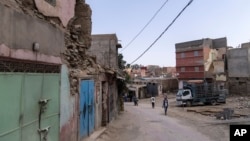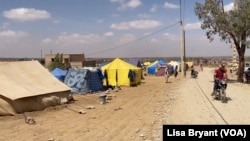A year after a massive earthquake struck Morocco’s High Atlas Mountains, people there say reconstruction has been slow, and many are still living in tents or have been forced to move elsewhere. Lisa Bryant reports.
Days after the 6.8 magnitude earthquake struck in September a year ago, tour guide Abdesamat El Gzouri showed a reporter his damaged home in Amizmiz, a town at the foot of the High Atlas Mountains.
Cracks covered the outside walls. His family was sleeping outside — fearful of another quake. Parts of Amizmiz were reduced to rubble.
In a phone interview, El Gzouri said his house is being renovated. It’s getting more pillars and new foundations to withstand future shocks. For now, his family lives in a rented apartment.
“The situation is much better than before,” he said. “There [are fewer] camps; people [are] getting back to their houses. Some reinforce their houses, they renovate. Some, they rebuild. But still, we have people living in tents.”
Morocco’s High Atlas region is a spectacular place. Its beauty and Berber culture have drawn tourists from all over. But it’s also one of the poorest and most underdeveloped parts of the country.
The government has earmarked $11 billion in aid to reconstruct the area. While tens of thousands of earthquake-affected people have gotten state support, reports say they have yet to get the full payment.
Reports also say many residents still live in plastic tents or have been forced to relocate. Some have protested for more support.
El Gzouri said the reconstruction is creating needed jobs — but there’s not other work. He is uncertain about his own job in a changed region.
“I do cultural tourism. You show people old houses, authentic houses — the way people lived 400-500 years ago,” he said. “That’s our tourism — what our business is about, it’s about the Berber culture. And now, the situation is different. People are building new houses with new standards. So, it’s not good for us.”
A father of four, El Gzouri said he’s happy that children are back at school. He’s less certain about the future of his town and region in the months and years to come.










